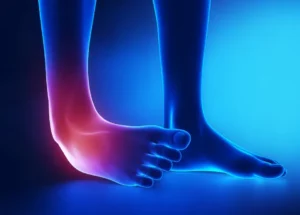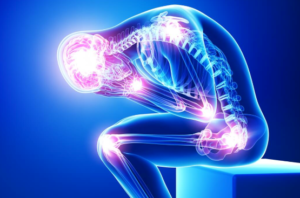Neck pain is a frequent complaint that affects many individuals at some point in their lives. The neck, or cervical spine, is a complex structure of bones, joints, muscles, and nerves that supports the head and allows for a wide range of motion. Due to its flexibility and the weight it supports, the neck can be susceptible to conditions that cause discomfort and restrict movement. Understanding where the pain is coming from is a step toward managing it. Here you can explore some common causes of neck pain.
Posture-Related Strain
Muscular strain from poor posture is a prevalent cause of neck pain, often stemming from daily activities like leaning over a computer or looking down at a smartphone. These prolonged positions force neck muscles to work harder, leading to fatigue and soreness over time. Even subtle habits, such as reading in bed without proper support or clenching your jaw, can contribute to this strain. To alleviate posture-related discomfort, making ergonomic adjustments to your workspace can be helpful. This includes positioning your monitor at eye level and utilizing a supportive chair, along with taking frequent breaks and performing exercises to strengthen neck and upper back muscles..
Injury-Related Trauma
Injuries are a common cause of neck pain, often stemming from accidents or sudden movements. Whiplash, direct impacts, or falls can all lead to damage in the neck’s soft tissues, ligaments, or cervical spine. Some points to understand and ways to prevent neck injuries include:
- Whiplash: Often caused by car accidents or sports incidents, whiplash occurs when the head is forcefully thrown backward and forward, stretching the neck’s soft tissues.
- Direct Impacts or Falls: Blows to the head or falls can cause serious damage to the cervical spine, ligaments, and muscles.
- Medical Evaluation: After an injury, seeking professional assessment is crucial to determine the extent of the damage.
- Treatment: Care typically includes rest followed by physical therapy to rebuild strength and flexibility.
- Prevention: Wearing seatbelts in vehicles and using protective gear during sports can greatly reduce the risk of neck injuries.
Degeneration-Related Pain
As the body ages, the structures of the neck naturally undergo wear and tear, which can lead to pain. Conditions such as osteoarthritis, degenerative disc disease, and herniated discs can cause cartilage deterioration, reduce disc hydration, and result in nerve compression. Managing degeneration-related pain involves maintaining neck mobility and strength through targeted exercises and physical therapy, which can help alleviate nerve pressure and improve posture. Staying active with low-impact activities like walking or swimming also supports overall spinal health and helps manage discomfort.
Stress-Related Tension
Emotional and mental stress often cause people to unconsciously tense their neck and shoulder muscles. This sustained muscle contraction can lead to chronic tension, stiffness, and persistent neck pain. If not properly addressed, this can create a self-perpetuating cycle of stress and pain. Finding effective ways to manage stress is beneficial for relieving this type of neck tension. Techniques that can be helpful include:
- Mindfulness and meditation
- Deep breathing exercises
- Regular physical activity
These practices help calm the nervous system and can reduce unconscious muscle tightening. Taking time for activities you enjoy can also play a role in breaking the stress-pain cycle.
Take Action for Neck Pain Relief
Neck pain stems from many sources, from daily habits to medical conditions. Identifying its cause allows for appropriate action, whether through posture correction, stress management, or professional guidance for injuries. Proactive measures are beneficial when it comes to relief. For severe, persistent, or accompanied pain, consult a healthcare professional for a thorough evaluation.














